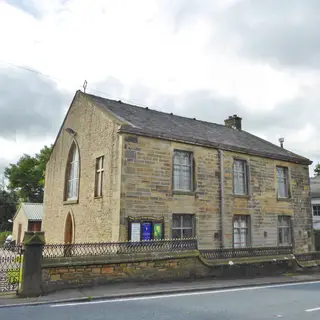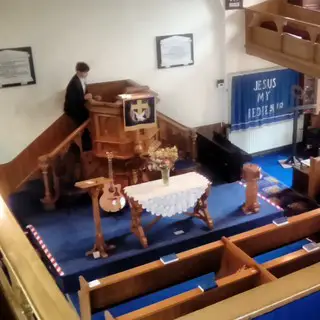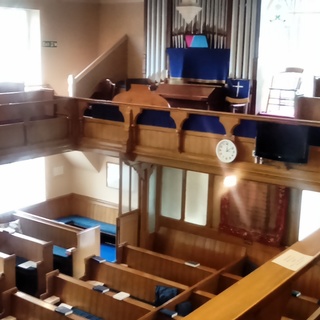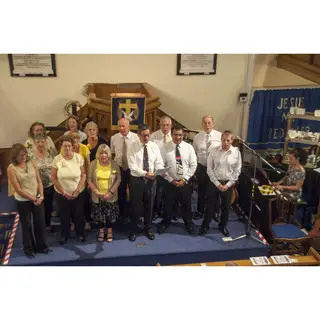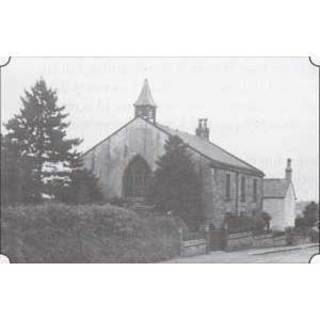We found 3 more Congregational Federation churches near Preston
Who we are
Knowle Green Church is an Evangelical Independent Church. We value tremendously the vision and heritage of our predecessors who in their humility and obedience to the Lord saw a real need in the community and together sought to do something about it.
A number of ordinary folks working in the nearby bobbin mills and farms built a place of Worship. Many over the years have come to a personal knowledge of the Lord Jesus Christ. 150 years on and we are still enjoying the legacy and the fruit of their labour. The Good News of the Lord Jesus Christ is still being fervently preached and the fellowship is still blessed by God.
In this age of Plurality and Pluralism, we believe and subscribe to the preaching of the Good News of Jesus Christ and the Cross for the Salvation to all men. We believe in His Resurrection and we await His coming again.
Motivation
Our motivation is to continue with the work of our predecessors and the foundation they laid. That is to preach Christ Crucified, obedience to the Great Commission matched by personal humility. We seek the work of the Holy Spirit and as Paul says in his letter to the Philippians “To know Christ and the Power of His Resurrection”. Let Jesus be real to all who are able to visit us.
Located in the beautiful Ribble Valley, Knowle Green Congregrational Church offers congregants a place of comfort, hope, and a peace of mind for all their worshipping needs. We are dedicated to spreading the teachings of Jesus Christ, and our goal is to inspire you through the holiness of our dwelling and our services. We invite you to become a part of our growing congregation, and look forward to meeting you!
A number of ordinary folks working in the nearby bobbin mills and farms built a place of Worship. Many over the years have come to a personal knowledge of the Lord Jesus Christ. 150 years on and we are still enjoying the legacy and the fruit of their labour. The Good News of the Lord Jesus Christ is still being fervently preached and the fellowship is still blessed by God.
In this age of Plurality and Pluralism, we believe and subscribe to the preaching of the Good News of Jesus Christ and the Cross for the Salvation to all men. We believe in His Resurrection and we await His coming again.
Motivation
Our motivation is to continue with the work of our predecessors and the foundation they laid. That is to preach Christ Crucified, obedience to the Great Commission matched by personal humility. We seek the work of the Holy Spirit and as Paul says in his letter to the Philippians “To know Christ and the Power of His Resurrection”. Let Jesus be real to all who are able to visit us.
Church Address
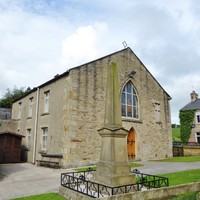
Clitheroe Road
Preston,
Lancashire
PR3 2YQ
United Kingdom
Phone: 01254 878 394
Download Knowle Green Congregational Church vCard with Service Times
Click here to contact the church
Church Pastor

Christopher Okpoti
Pastor
Clitheroe Road
Preston,
Lancashire
PR3 2YQ
United Kingdom
Phone: 01254 878 394
Download Pastor Christopher Okpoti vCard
Click here to contact Christopher Okpoti
Denomination
Congregational Federation
Congregational Federation churches in Preston, Lancashire
Congregational Federation churches in Lancashire
Congregational Federation churches in United Kingdom
Congregational Federation churches churches near me
All churches in Preston, Lancashire

Affiliations
Church Website
Knowle Green Congregational Church on Social Media
Leadership
Leader Name:
Christopher Okpoti
Leader Position:
Pastor
Formal Title:
Leader Address:
Phone:
Fax:
Leader Email:
Click here to contact Christopher Okpoti
Leader Bio:
Christopher Okpoti on Social Media:
Other Church Leaders:
Leadership Photos
Administration
Admin Name:
Admin Position:
Admin Address:
Phone:
Fax:
Admin Email:
Mailing Address
Driving Directions
Travel/Direction Tips
Know how to get there? Share the knowledge with others!
Parking
Please share parking information and/or parking experience!
Knowle Green Congregational Church Service Times
Weekly events
Come Worship with Us!
Sunday Service: 11 am 12:15 pm
(tea and coffee served after)
Devotional Service
9:45m every Sunday
(excluding the 1st Sunday of the month)
Agape Fellowship Meeting Sunday 2:30 pm - 3:30 pm
(1st Sunday ONLY)
Prayer Meeting
Tuesday 7:30 pm - 9:00 pm
Fortnightly
Knowle Green Congregational Church service times last updated on the 6th of January, 2025
Come Worship with Us!
Sunday Service: 11 am 12:15 pm
(tea and coffee served after)
Devotional Service
9:45m every Sunday
(excluding the 1st Sunday of the month)
Agape Fellowship Meeting Sunday 2:30 pm - 3:30 pm
(1st Sunday ONLY)
Prayer Meeting
Tuesday 7:30 pm - 9:00 pm
Fortnightly
Knowle Green Congregational Church service times last updated on the 6th of January, 2025
Worship Languages
Dress Code
Sunday School / Children and Youth Activities
Under 12s:
Under 18s:
Local outreach & community activities
Other activities & ministries
Special Needs/Accessibility
Prayers and Hymns
Main Bible:
Hymns and Songs:
Other information
Average Adult Congregation:
Average Youth Congregation:
Additional Info:
Knowle Green Congregational Church Preston Photos
Knowle Green Congregational Church History
The year is 1822 and William Bond, a cotton spinner from Chipping, purchases the cotton mill at Knowle Green. He is concerned about the morals of the people who we read spend their Sunday’s playing football, fighting being their only recreation and drinking their chief business. So he advertises for someone to come and work in his mill and act as a missionary to his 38 employees and to the villagers. An intrepid twenty four year old warper who attended Chapel Street Congregational Church, Blackburn answers the advert. The contrast between 1820’s Blackburn and Knowle Green must have been great but William set about his task with vigour, determination and above all faith in the Living Lord Jesus and commenced holding prayer meetings in an upper room at the mill with such success that by 1827 Knowle Green was in receipt of funding from the Lancashire Congregational Union suggesting that in five short years there was a thriving Christian community at Knowle Green. William applied for the position as warper in the mill on 15th April 1822, on the 26th February 1831 the church was officially opened. In less than nine years a Christian community had been formed at Knowle Green and a church building, mainly self- built and costing £100.00, was opened. A truly remarkable achievement. By this time William no longer worked in the mill, which finally closed in 1864 at the time of the cotton famine. At thirty- three years of age he was now the minister of the fellowship he had been instrumental in founding and which by the time of his death in 1858 had outgrown the original building that “would only accommodate 220 persons”. He was the first person to be buried in the then new graveyard.
Rev. Giles Scott, who came to Knowle Green after spending four years at the now closed Walker Fold Chapel at Chaigley, succeeded William. Giles was also a man of vision who immediately set about the task of solving the problem of lack of space for worship.
When William had come to Knowle Green handloom weaving together with farming was the principal occupation of the local population. Weaving was not yet mechanized, there was plenty of cotton from the newly mechanized spinning mills and hand-loom weavers had lots of work and could expect to earn fifteen shillings a week compared to £2.00 for a woman in service. Knowle Green was a comparatively affluent area, in fact on maps of 1786 and 1818 Knowle Green is named whilst Longridge is not.
But by 1860 the picture was very different. Handloom weaving was very much a declining industry and many of the young people had moved to the work in the mills in the local towns. There was still some work to be had in the local bobbin mills but Knowle Green was a much poorer area than thirty years previously with a more aged population. Giles Scott and the fellowship were undeterred. Through prayer they sought the Lord’s leading and guidance and realized that the Lord had already prepared the way forward. A man had started to build a new public house across the road from the then church but had run out of money and it was this shell that the members purchased together with 500 yards of land, now part of the old graveyard, and two cottages at a cost of £260.00. The shell that had been intended for the selling of alcoholic spirit became the centre for the spreading of the Holy Spirit to the people of Knowle Green.
The whole cost including fittings was expected to be around £500.00 but inflation even then seems to have played a part and by the time the new church was opened in 1867 the cost had risen to £600.00 although only a debt of £60.00 remained which was removed by the offerings at the opening services. The rest of the money had been raised by private subscriptions during the previous six years from locals and money- raising trip by Giles Scott to interested persons as far away as Manchester.
In addition to all this fund raising the members became concerned about their family and friends who had moved to Longridge to find work in the mills. There was no Congregational Church in Longridge so this rapidly aging and increasingly impoverished people already seeking funds to build and furnish their new church building, somehow raised £1000.00 to help finance the building of a Congregational church in Longridge which was opened in 1865. Within seven years of his coming to Knowle Green Giles Scott had seen the opening of the church in Longridge and the opening of the new church at Knowle Green.
The recurrent theme throughout the early-recorded history of the church at Knowle Green was prayer. Prayer meetings in an upper room in 1822, prayer meetings at the opening of the building in 1831, prayer meeting before, during and after expansion plans in the 1860’s and prayer meeting before the building of Longridge Congregational church. Our forefathers at Knowle Green sought the Lord’s will through prayer and were prepared to follow His leading and the guidance despite the social and economic conditions that prevailed at the time.
In the days long before e-mail and rapid communications Giles Scott was “struck with the inconvenience to which country people were put in getting letters through the post”. He argued that if a letter carrier required a penny for delivering a letter of the roadside along his route, he would expect two pence or more if he had to go out of his way. Giles believed that this rural difficulty could be overcome if the carrier had some other occupation such as selling tea then one could subsidize the other. And this is what happened. Starting from Longridge on the Ribchester Road the limit was Fleet Street corner and Stonyhurst College on the Clitheroe Road. Letters were delivered, tea was sold and the Christian message and what was happening at Knowle Green Church was passed on to all. Perhaps the present day postal service could learn a thing or two from Giles!
The original church was now converted into a day school. For most village children there had been no education other than Sunday school until the opening of the Knowle Green British School in April 1872. The school remained opened until its closure ninety years later in 1962 most village children, myself included, being educated there. More prayer and more money raising.
Giles retired from Knowle Green in 1888 and went to live in Ilkley where he died in 1896. He is buried in the old graveyard at Knowle Green together with his wife Esther who had died in 1877.
But prayer, expansion and money raising went hand in hand under the leadership of the new minister, Rev. R.R.Davies. A Welshman, he came to Knowle Green from Kirkham and was the great grandfather of the late Peter Morgan who did so much in the 1990’s to upgrade the Village Hall. During his thirteen years at Knowle Green considerable alterations were made to the school and new heating systems were installed in the school and the church. And all this continued when Rev. R Walker-Berry became the minister in 1904 with the installation of an organ build by Richardson of Preston, and other essential maintenance plus the setting up of a monthly Thursday Sermon which attracted an average attendance of 70. A Week of Prayer was held during December 1910. Records state that all were aware of the presence of the Holy Spirit and at the close of the week “several were brought to Christ. We never realized the power of God so much as during the last few weeks: the whole Church has been quickened, the Spiritual tone is high and our expectations great”. Mr. Walker-Berry was also an enthusiastic photographer and his snaps were made into postcards that were sold in the local shops and can still be found at collector’s fairs today. If you see a photograph of the area with R.W.B. printed on the corner, it's one of his.
Rev. Harold Green who was the leader here during the horrors of the First World War, which saw several local men go to fight, followed R.W.B. as minister. Some soldiers returned but four did not and are named on the village War Memorial erected in 1920 and funded by public subscription at a cost of £144.00 plus £14.1s.3d for lettering. Come and look at the memorial and look for the (deliberate?) mistake. But the war changed things in the village: before the war there had been a flourishing village Brass Band meeting in the school room, after the war there is no record of it: the war changed attitudes and Knowle Green became a place for the workers from the towns to enjoy a day out, Knowle Green Bottoms especially popular, and the war changed peoples social life for the Village Institute, now called the Village Hall, saw the laying of its foundation stone in 1923.
The church was never entirely at one with these changes and between 1932 and 1976 there were eight changes of ministers – in the first hundred years of church history at Knowle Green there had been five ministers. During this period the church was redecorated twice and electricity was installed and then in the early 1970’s the Knowle Green kidz church room was built.
In 1976 Jeff Jones came to Knowle Green as the 14th minister of the church and became the catalyst for renewed outward looking Christian activity. This had always been there throughout the years but now there was renewed faith, a younger congregation and prayer centered worship. “Jesus Christ is Lord” was painted over the pulpit and all knew the truth of it.
Sadly Jeff died in 2005 and the new pastor, Christopher Okpoti, is determined to lead the church forward with prayer, vision, leadership, faith and passion, once again seeking to expand. Both the Kidz room and the car park are too small and other alterations need to be made to meet the needs of a modern increasing congregation – history repeating itself? As Chris says, we must proclaim the name of Jesus, tell people about the saving love of Jesus so that they too may have the joy and the assurance of eternal life with Christ that we have.
There have been many changes throughout the near two hundred years of church history at Knowle Green: economically the village has gone from prosperity to near poverty to today’s relative affluence as a commuter area close to the motorway network and demographically the population has steadily declined and church numbers have fluctuated accordingly but today people regularly attend the fellowship from a wide area. But throughout the period, whatever political, social and economic factors have prevailed, the Word of the Lord Jesus Christ has been preached with truth, conviction and faith.
When William had come to Knowle Green handloom weaving together with farming was the principal occupation of the local population. Weaving was not yet mechanized, there was plenty of cotton from the newly mechanized spinning mills and hand-loom weavers had lots of work and could expect to earn fifteen shillings a week compared to £2.00 for a woman in service. Knowle Green was a comparatively affluent area, in fact on maps of 1786 and 1818 Knowle Green is named whilst Longridge is not.
But by 1860 the picture was very different. Handloom weaving was very much a declining industry and many of the young people had moved to the work in the mills in the local towns. There was still some work to be had in the local bobbin mills but Knowle Green was a much poorer area than thirty years previously with a more aged population. Giles Scott and the fellowship were undeterred. Through prayer they sought the Lord’s leading and guidance and realized that the Lord had already prepared the way forward. A man had started to build a new public house across the road from the then church but had run out of money and it was this shell that the members purchased together with 500 yards of land, now part of the old graveyard, and two cottages at a cost of £260.00. The shell that had been intended for the selling of alcoholic spirit became the centre for the spreading of the Holy Spirit to the people of Knowle Green.
In the days long before e-mail and rapid communications Giles Scott was “struck with the inconvenience to which country people were put in getting letters through the post”. He argued that if a letter carrier required a penny for delivering a letter of the roadside along his route, he would expect two pence or more if he had to go out of his way. Giles believed that this rural difficulty could be overcome if the carrier had some other occupation such as selling tea then one could subsidize the other. And this is what happened. Starting from Longridge on the Ribchester Road the limit was Fleet Street corner and Stonyhurst College on the Clitheroe Road. Letters were delivered, tea was sold and the Christian message and what was happening at Knowle Green Church was passed on to all. Perhaps the present day postal service could learn a thing or two from Giles!
Giles retired from Knowle Green in 1888 and went to live in Ilkley where he died in 1896. He is buried in the old graveyard at Knowle Green together with his wife Esther who had died in 1877.
But prayer, expansion and money raising went hand in hand under the leadership of the new minister, Rev. R.R.Davies. A Welshman, he came to Knowle Green from Kirkham and was the great grandfather of the late Peter Morgan who did so much in the 1990’s to upgrade the Village Hall. During his thirteen years at Knowle Green considerable alterations were made to the school and new heating systems were installed in the school and the church. And all this continued when Rev. R Walker-Berry became the minister in 1904 with the installation of an organ build by Richardson of Preston, and other essential maintenance plus the setting up of a monthly Thursday Sermon which attracted an average attendance of 70. A Week of Prayer was held during December 1910. Records state that all were aware of the presence of the Holy Spirit and at the close of the week “several were brought to Christ. We never realized the power of God so much as during the last few weeks: the whole Church has been quickened, the Spiritual tone is high and our expectations great”. Mr. Walker-Berry was also an enthusiastic photographer and his snaps were made into postcards that were sold in the local shops and can still be found at collector’s fairs today. If you see a photograph of the area with R.W.B. printed on the corner, it's one of his.
The church was never entirely at one with these changes and between 1932 and 1976 there were eight changes of ministers – in the first hundred years of church history at Knowle Green there had been five ministers. During this period the church was redecorated twice and electricity was installed and then in the early 1970’s the Knowle Green kidz church room was built.
Sadly Jeff died in 2005 and the new pastor, Christopher Okpoti, is determined to lead the church forward with prayer, vision, leadership, faith and passion, once again seeking to expand. Both the Kidz room and the car park are too small and other alterations need to be made to meet the needs of a modern increasing congregation – history repeating itself? As Chris says, we must proclaim the name of Jesus, tell people about the saving love of Jesus so that they too may have the joy and the assurance of eternal life with Christ that we have.
There have been many changes throughout the near two hundred years of church history at Knowle Green: economically the village has gone from prosperity to near poverty to today’s relative affluence as a commuter area close to the motorway network and demographically the population has steadily declined and church numbers have fluctuated accordingly but today people regularly attend the fellowship from a wide area. But throughout the period, whatever political, social and economic factors have prevailed, the Word of the Lord Jesus Christ has been preached with truth, conviction and faith.
Knowle Green Congregational Church Historical Photos
 "We must alter our lives in order to alter our hearts, for it is impossible to live one way and pray another".
"We must alter our lives in order to alter our hearts, for it is impossible to live one way and pray another". William Law
Knowle Green Congregational Church listing was last updated on the 6th of January, 2025
THANK YOU FOR VISITING KNOWLE GREEN CONGREGATIONAL CHURCH ONLINE!
Knowle Green Congregational Church Accelerated Mobile Page (AMP)


